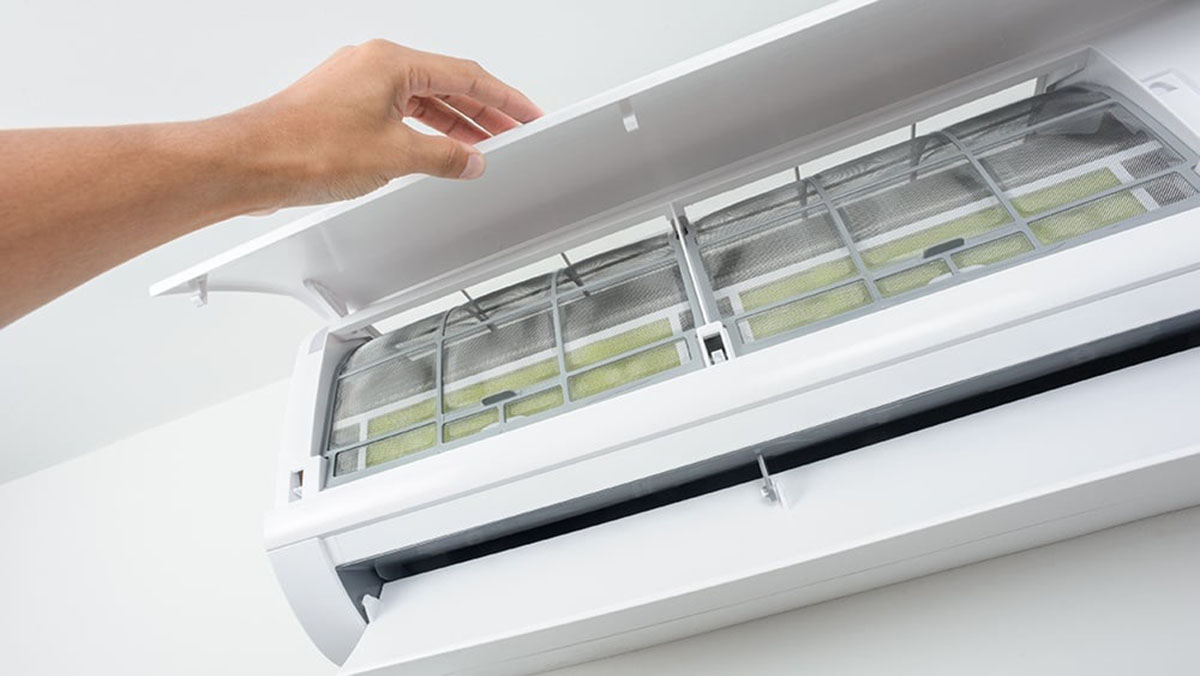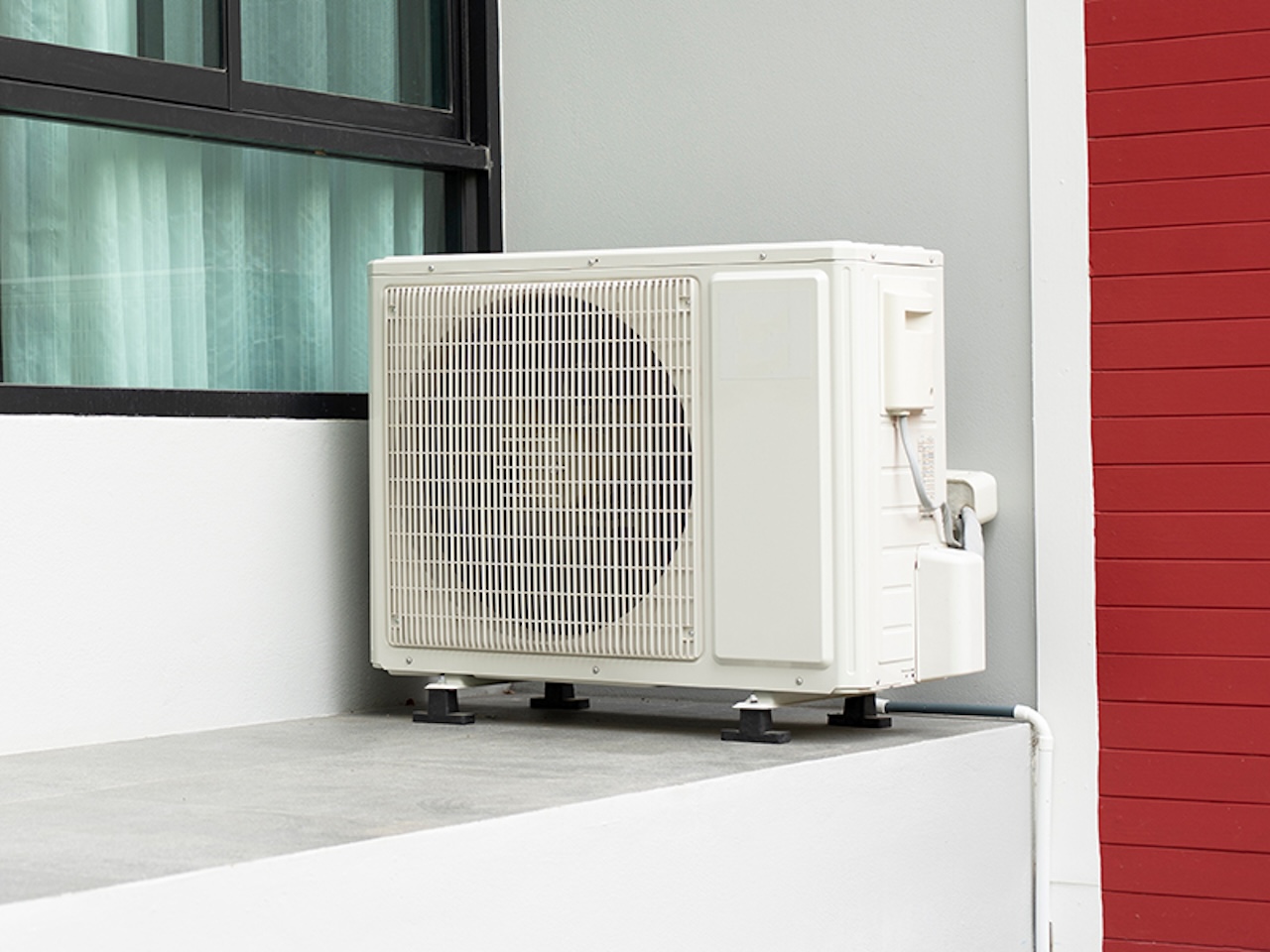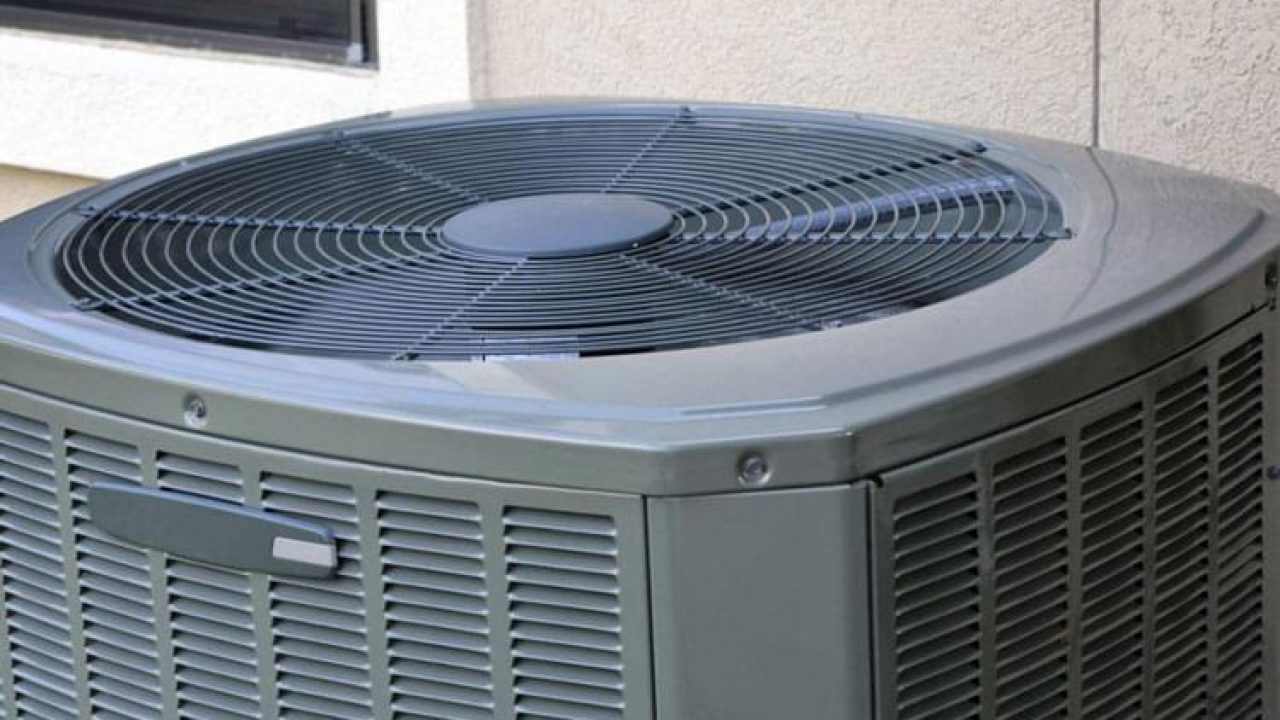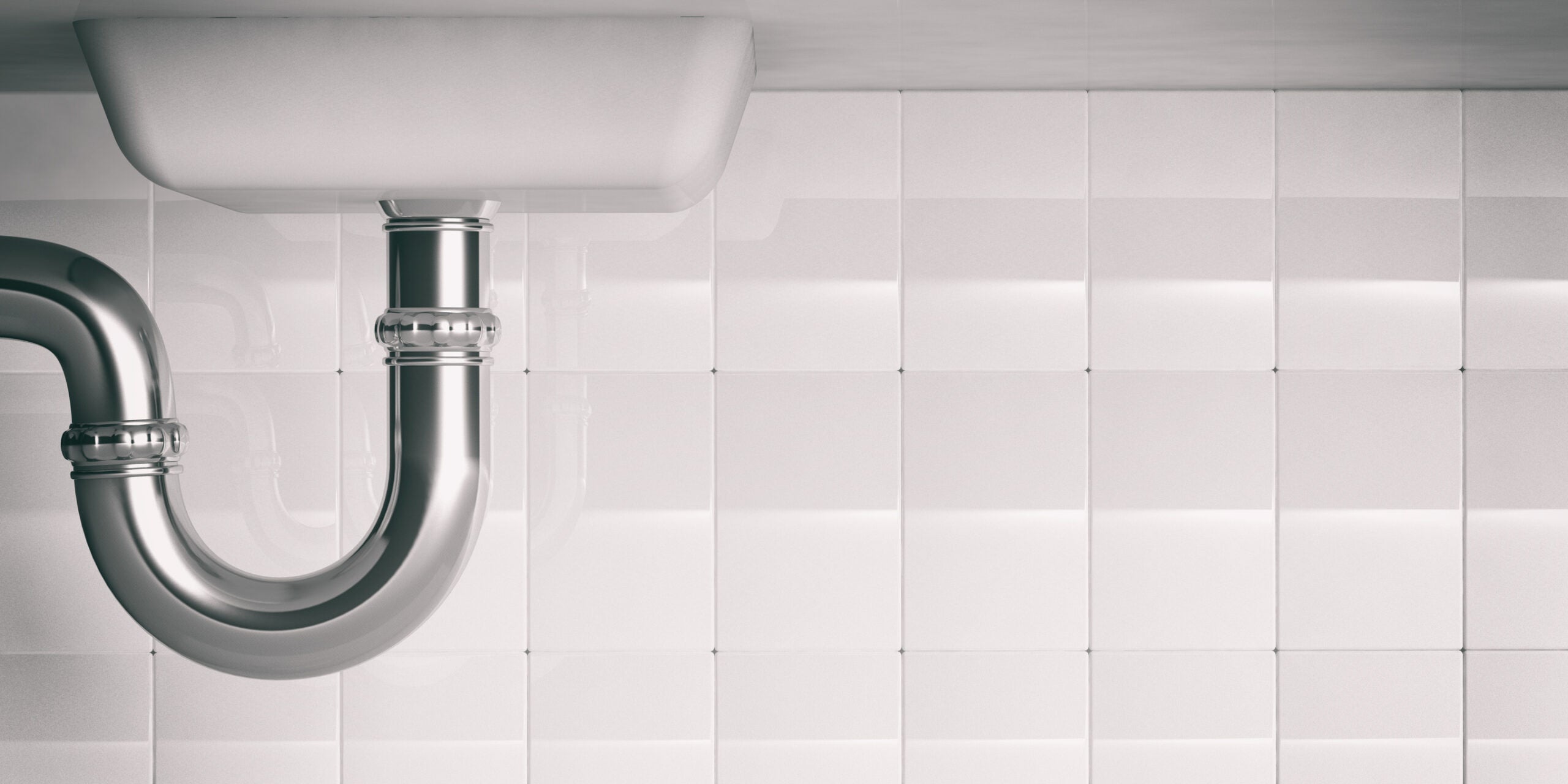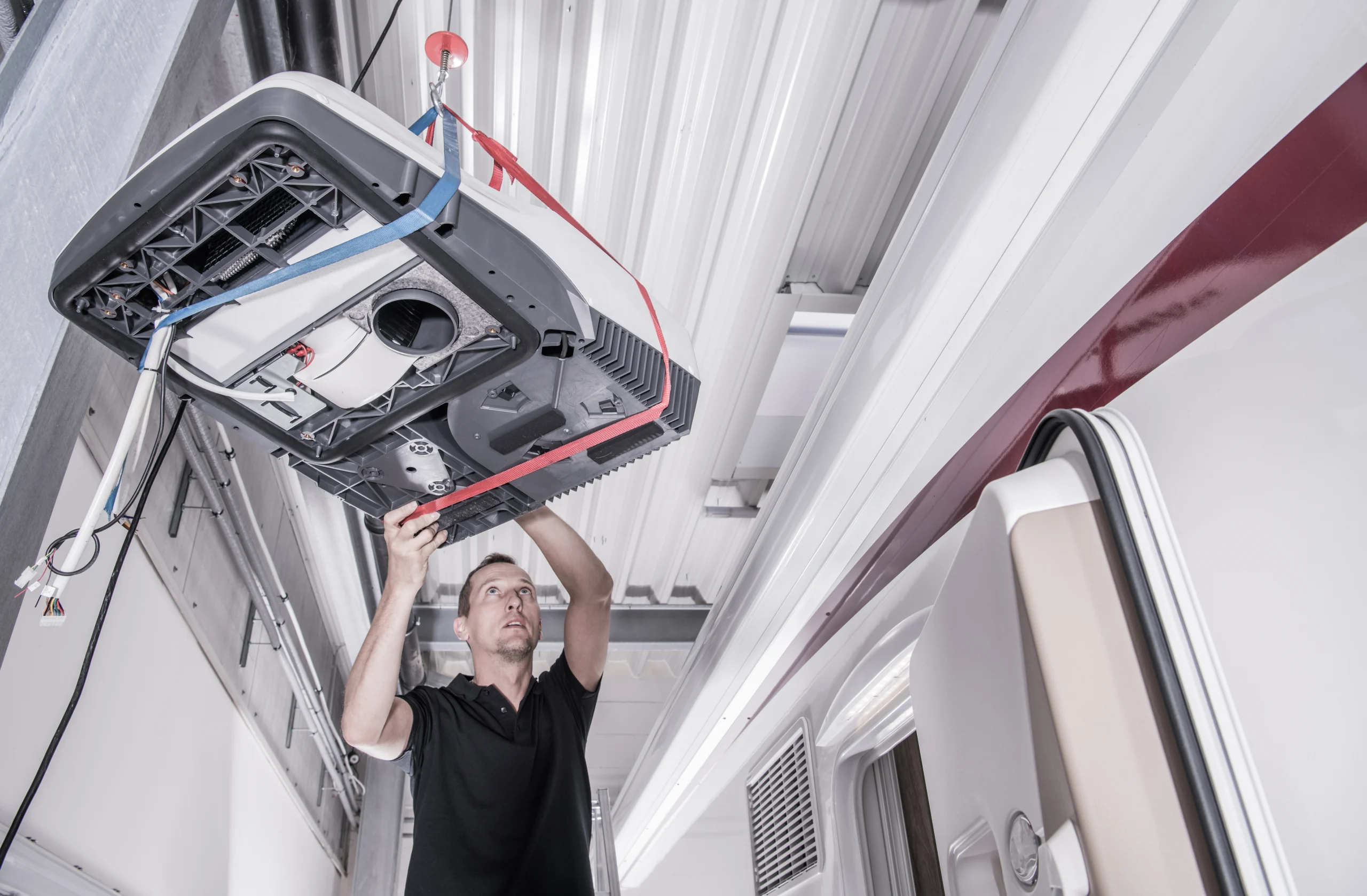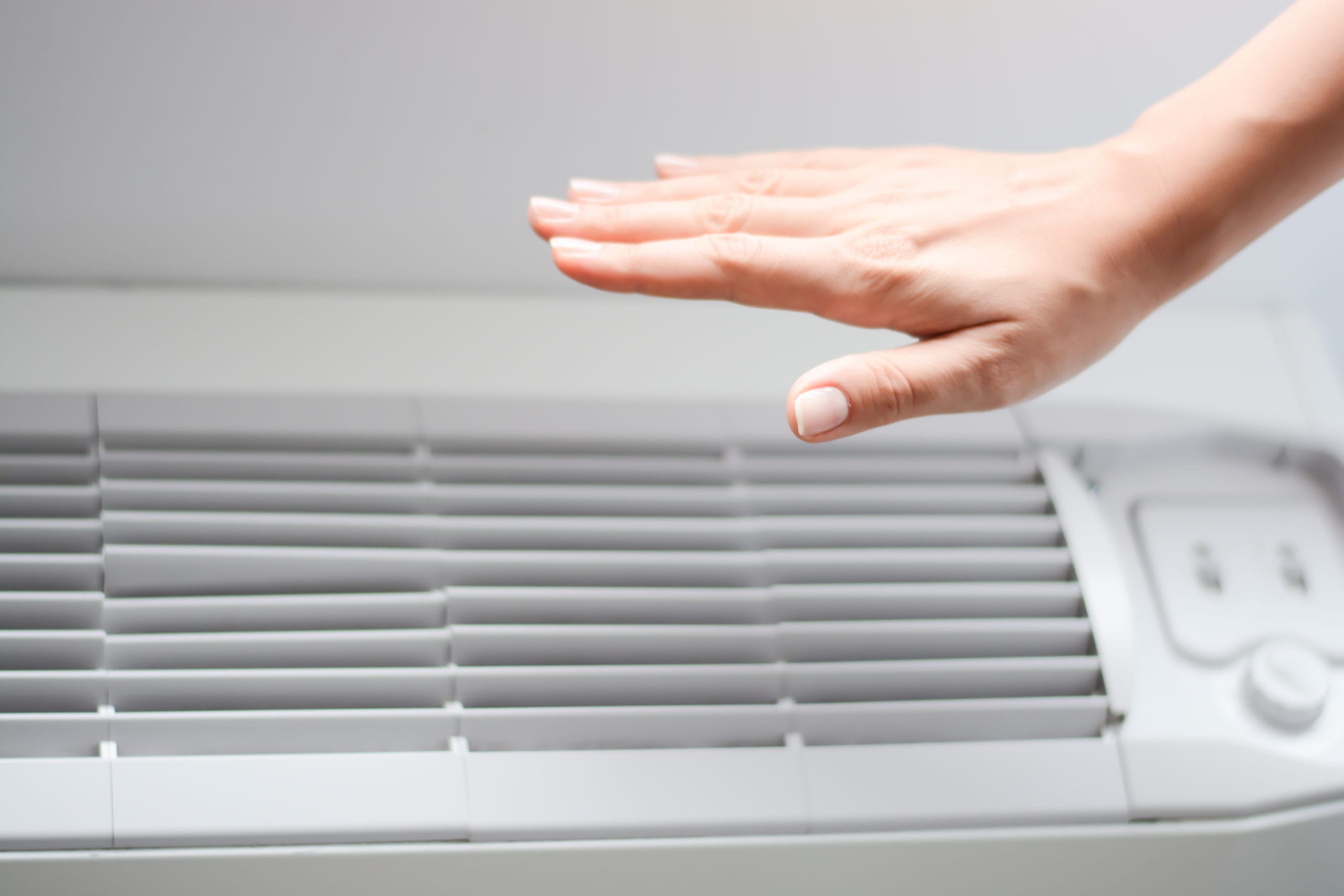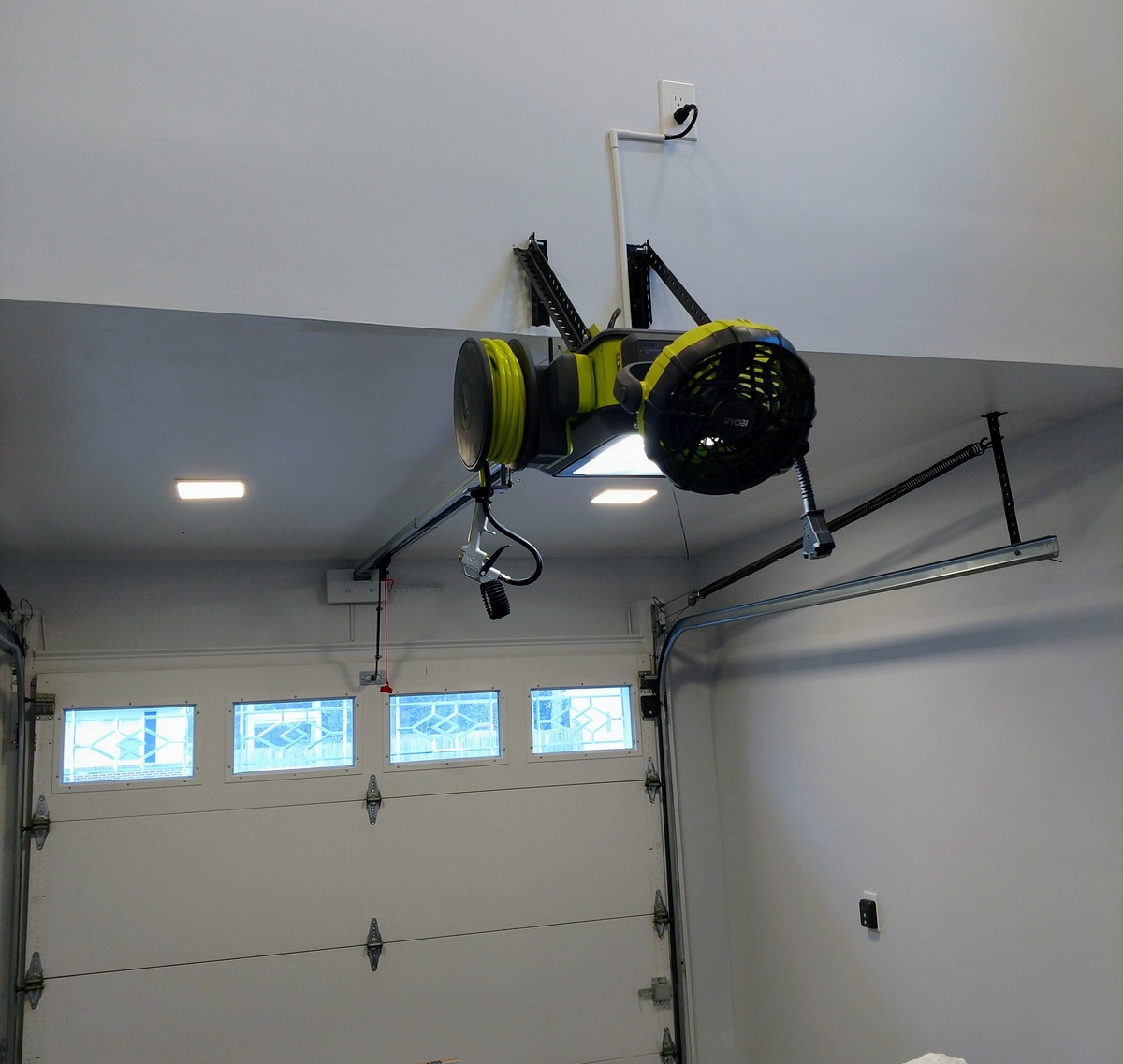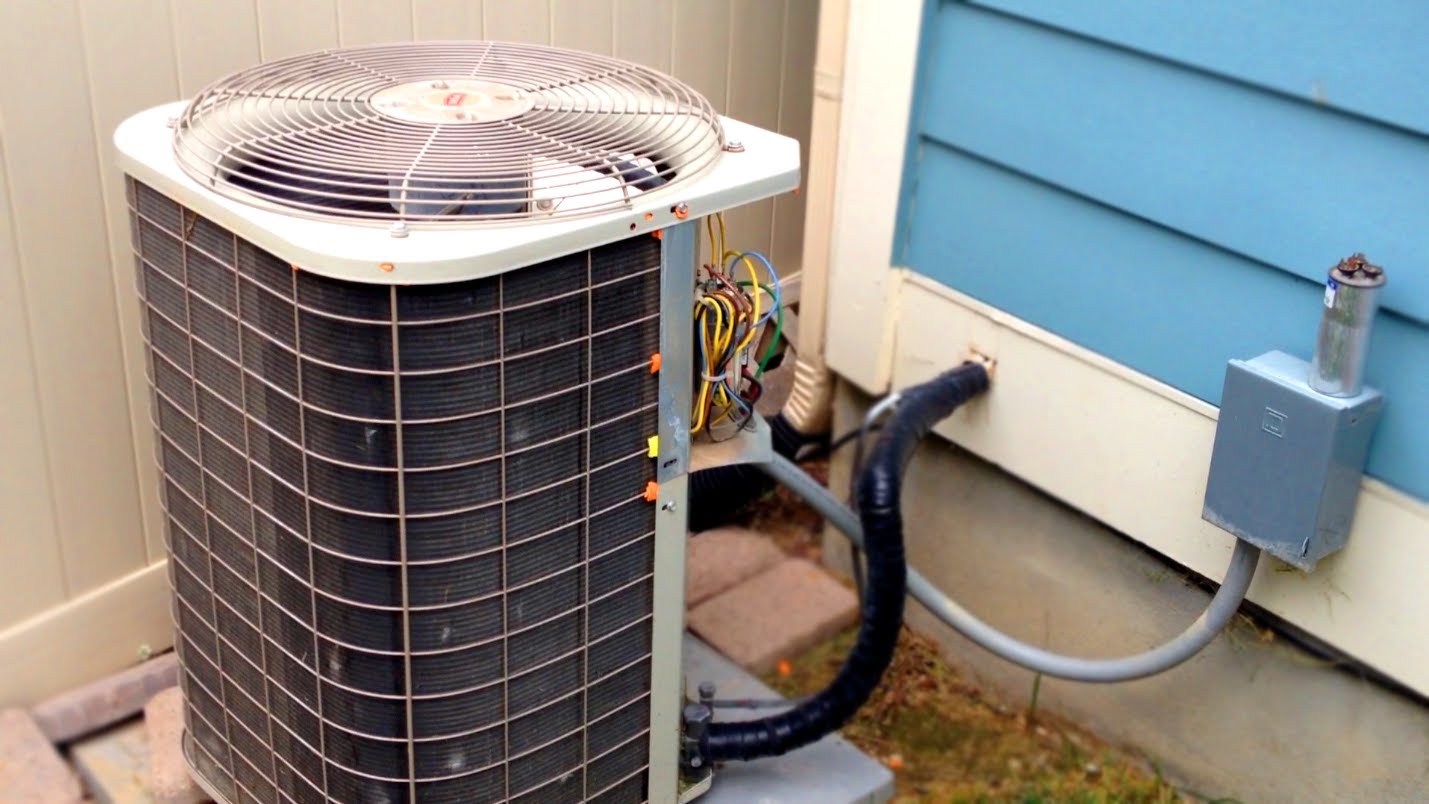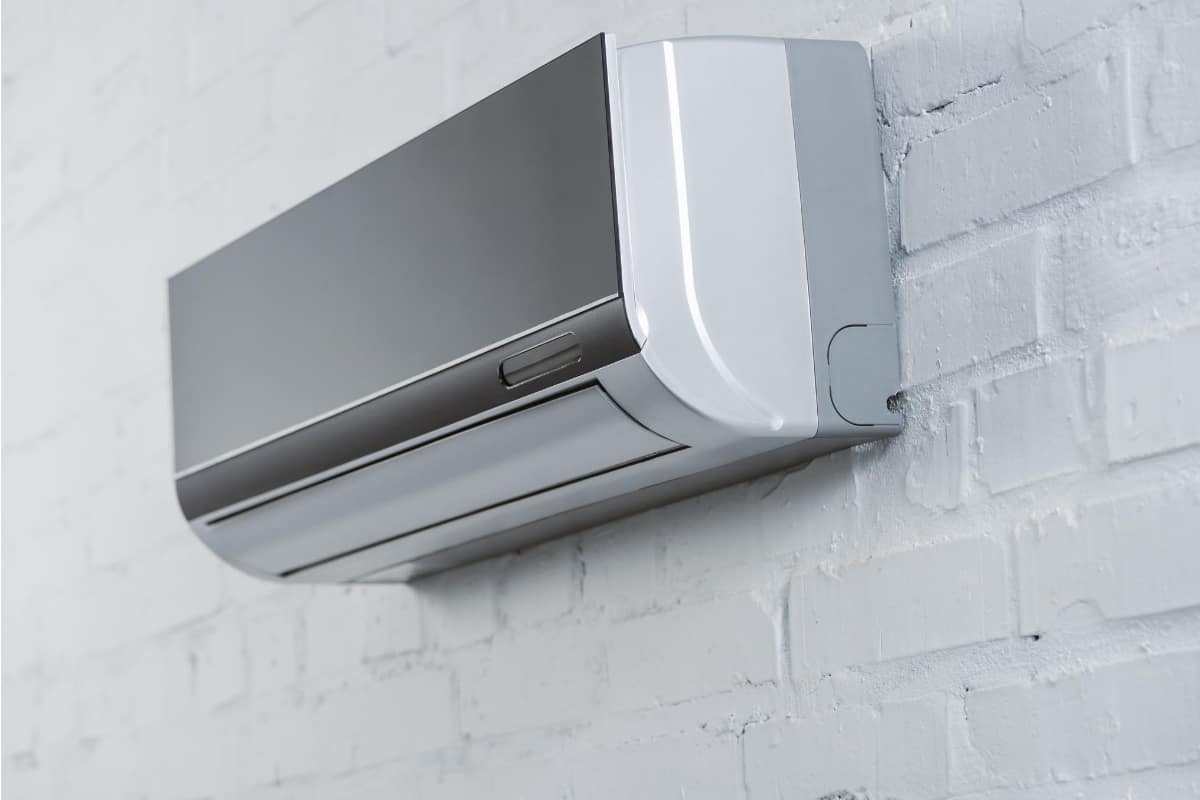Home>Home Maintenance>Why Is My Air Conditioner Making Sound?


Home Maintenance
Why Is My Air Conditioner Making Sound?
Modified: October 20, 2024
Discover why your air conditioner is making sound and find out how to fix it. Ensure your home maintenance is up to date with our helpful tips and advice.
(Many of the links in this article redirect to a specific reviewed product. Your purchase of these products through affiliate links helps to generate commission for Storables.com, at no extra cost. Learn more)
Introduction
When it comes to keeping our homes cool and comfortable, air conditioners are a godsend. They work tirelessly to keep us cool during those scorching summer months. But what do you do when your trusty air conditioner starts making strange noises? Should you be concerned? Is it a sign of a major problem or just a minor annoyance?
As it turns out, air conditioner noise is more common than you might think. There are various reasons why your air conditioner might be making sound, ranging from loose or damaged parts to motor issues and dirty filters. Understanding the source of the noise is vital in determining whether or not it requires immediate attention or if it can be easily fixed.
In this article, we will explore the most common causes of air conditioner noise and provide you with some valuable tips on how to diagnose and fix the problem. So, let’s dive in and find out why your air conditioner is making sound!
Key Takeaways:
- Regular maintenance and prompt repairs, such as tightening loose parts and lubricating the motor, can reduce air conditioner noise and ensure a peaceful and efficient cooling experience.
- Consulting a professional for proper installation, addressing electrical issues, and installing anti-vibration pads are crucial steps to minimize air conditioner noise and maintain a quiet home environment.
Common Causes of Air Conditioner Noise
There are several potential causes for air conditioner noise. Identifying the source of the noise can help you determine the most appropriate solution. Here are some common culprits:
- Loose or Damaged Parts: Over time, the vibration and movement of the air conditioning unit can loosen or damage components. Loose fan blades, screws, or brackets can create rattling or banging sounds.
- Motor Issues: A malfunctioning motor can produce a variety of noises. For example, a worn-out motor might emit squealing or screeching sounds, while a faulty bearing can result in a grinding noise.
- Dirty or Clogged Filters: When air filters become dirty or clogged with debris, air circulation can be restricted. This can cause the air conditioner to work harder and produce a humming or whistling noise.
- Refrigerant Leaks: If there is a refrigerant leak, you might hear a hissing or bubbling sound. It’s important to address this issue promptly as it can affect the efficiency and performance of your air conditioner.
- Blocked or Damaged Ductwork: Obstructions or damage to the ductwork can disrupt airflow and lead to airflow restrictions, resulting in rattling or whooshing sounds.
- Fan Problems: Issues with the fan can cause various noises, such as buzzing, clicking, or squealing. This could be due to a misaligned fan blade, loose motor mount, or worn-out bearings.
- Electrical Issues: Faulty electrical components or wiring can create buzzing or humming sounds. It’s important to address electrical problems promptly to prevent safety hazards.
- Vibrating Unit: If your air conditioner is not properly installed or mounted, it may vibrate excessively, leading to a rumbling or shaking sound.
- Improper Installation: An air conditioner that was not installed correctly can result in various noises. This could be due to loose connections, inadequate insulation, or improper positioning.
Now that we have identified some of the common causes of air conditioner noise, let’s move on to discuss how you can diagnose and fix these issues in the next section.
Loose or Damaged Parts
One of the primary reasons your air conditioner might be making noise is due to loose or damaged parts. Over time, the constant vibration and movement of the unit can cause screws, fan blades, or brackets to become loose or even damaged. This can result in rattling, clanking, or banging noises.
To diagnose if loose or damaged parts are the cause of the noise, start by turning off your air conditioner and inspecting the unit. Look for any visible signs of loose screws or brackets. Check the fan blades to ensure they are securely attached and not wobbling. If you notice any loose or damaged components, it’s important to tighten or replace them to prevent further issues.
You can use basic tools like a screwdriver or wrench to tighten any loose screws or brackets. Ensure that they are tightened securely but not over-tightened, as this can cause damage. If you discover damaged parts, such as cracked or broken fan blades, it’s recommended to replace them to maintain optimal performance and reduce noise.
If you are uncomfortable or unsure about handling these repairs yourself, it is always best to consult a professional HVAC technician. They have the expertise and experience to properly diagnose and fix any issues with your air conditioning unit.
By addressing loose or damaged parts promptly, you can eliminate the source of the noise and ensure that your air conditioner operates smoothly and quietly.
Motor Issues
A malfunctioning motor is another common cause of air conditioner noise. The motor plays a vital role in powering the fan and compressor, so any issues with it can result in unusual sounds. Here are a few motor-related problems that can lead to noise:
Squealing or Screeching Sounds: If you hear high-pitched squealing or screeching noises coming from your air conditioner, it is likely due to a worn-out motor belt. Over time, the belt can become loose or damaged, causing it to slip or rub against other parts of the unit. Replacing the motor belt should resolve this issue and eliminate the noise.
Grinding Noises: A grinding noise typically indicates a problem with the motor’s bearings. Over time, these bearings can wear out, resulting in a friction noise when the motor is running. It is essential to address this issue promptly, as continued operation with damaged bearings can cause further damage to the motor. A professional technician can inspect and replace the faulty bearings to restore smooth and quiet operation.
Motor Humming: If you notice a persistent humming sound coming from your air conditioner, it could indicate a problem with the motor’s electrical components. Faulty capacitors or voltage issues can cause the motor to emit a constant humming noise. It is crucial to address this issue promptly to prevent further damage. A professional technician will be able to diagnose and resolve electrical issues to eliminate the humming sound.
When dealing with motor issues, it is essential to leave the repairs to a qualified HVAC technician. They have the expertise and knowledge to safely handle and repair motor-related problems. Attempting to fix these issues yourself can lead to further damage or even risk electrical hazards.
Regular maintenance of your air conditioner, including lubricating the motor and ensuring proper belt tension, can prevent motor-related problems and prolong the lifespan of your unit. Consult the manufacturer’s guidelines or hire a professional for regular servicing to keep your air conditioner running smoothly and quietly.
Dirty or Clogged Filters
Dirty or clogged filters are a common culprit when it comes to air conditioner noise. As air passes through the filters, they capture dust, dirt, and other airborne particles. Over time, these particles build up and restrict the airflow, causing your system to work harder and produce unnecessary noise.
To determine if dirty or clogged filters are the source of the noise, start by locating the air filters in your air conditioning unit. They are typically located in the return air duct or within the air handler unit. Remove the filters and inspect their condition. If they appear dirty, covered in debris, or you can visibly see blockage, it’s time for a cleaning or replacement.
Cleaning or replacing your air filters is a relatively simple task. For reusable filters, follow the manufacturer’s instructions for cleaning and maintenance. Typically, this involves rinsing the filters with water and allowing them to air dry before placing them back into the unit.
For disposable filters, replace them with new ones according to the manufacturer’s recommendations. It’s generally recommended to change disposable filters every 1-3 months, depending on usage and the specific filter type.
Regular maintenance and cleaning of your air filters not only reduce noise but also improve indoor air quality and prevent airflow restrictions. It allows your air conditioner to operate more efficiently, potentially reducing energy consumption and extending the lifespan of your unit.
In addition to cleaning or replacing the filters, it’s a good practice to schedule regular maintenance checks with a professional HVAC technician. They can perform a thorough inspection of your unit, clean components, and ensure everything is in proper working order to maintain optimal performance and minimize noise.
Read more: Why Is My Alexa Making Mario Sounds
Refrigerant Leaks
If you notice a hissing or bubbling sound coming from your air conditioner, it could indicate a refrigerant leak. Refrigerant is a vital component that helps cool the air in your system. When there is a leak, not only does it affect the efficiency of your unit, but it can also lead to noisy operation.
Refrigerant leaks can occur due to several reasons, such as corrosion, vibration, or damage to the copper lines or coils. If you suspect a refrigerant leak, it is crucial to address the issue promptly. Here are the steps to take:
1. Turn off the Air Conditioner: Before inspecting or attempting any repairs related to refrigerant leaks, ensure that the air conditioner is turned off to prevent further damage.
2. Call a Professional: Refrigerant leaks require the expertise of a professional HVAC technician. They have the tools, knowledge, and experience to identify and repair the leak. Attempting to fix refrigerant leaks yourself can be dangerous and may violate environmental regulations.
3. Leak Detection and Repair: The technician will use specialized tools and techniques to locate the source of the leak. Once identified, they will repair the leak and recharge the system with the appropriate amount of refrigerant. This will restore proper functioning and eliminate the noise associated with the leak.
It’s important to address refrigerant leaks promptly as they can impact the efficiency and cooling capacity of your air conditioner. Additionally, refrigerant leaks can pose environmental risks as certain types of refrigerants are harmful to the ozone layer.
To prevent refrigerant leaks in the future, schedule regular maintenance checks with a professional technician. They can inspect your system, check for any signs of leaks, and perform necessary repairs or preventive measures to ensure your air conditioner operates efficiently and quietly.
Blocked or Damaged Ductwork
Blocked or damaged ductwork can contribute to air conditioner noise and impact the overall performance of your HVAC system. The ductwork is responsible for distributing cooled air throughout your home, and any obstructions or damage can disrupt the airflow, resulting in noisy operation.
Here are some common issues related to blocked or damaged ductwork:
Obstructions: Over time, dust, debris, or even pests can find their way into the ductwork, leading to blockages. As the air tries to pass through the blocked areas, it can create rattling, whooshing, or whistling noises. Inspecting the visible sections of ductwork can help identify any visible obstructions or debris buildup.
Duct Damage: Damaged or disconnected ductwork can affect airflow and cause noise. In some cases, ducts may become loose or develop leaks, leading to air leakage and unwanted noise. Inspecting the ductwork for any visible signs of damage or disconnected sections is essential.
If you suspect blocked or damaged ductwork, here are some steps to address the issue:
1. Check and Remove Obstructions: Start by visually inspecting the accessible sections of your ductwork. Look for any obstructions, such as debris or objects, and remove them carefully. Be cautious not to damage or disrupt any other components while clearing the ducts.
2. Seal and Repair Ducts: If you notice any gaps, leaks, or disconnected sections in your ductwork, it’s important to seal and repair them. Use foil tape or mastic sealant to seal any gaps or leaks. If there are disconnected sections, reattach them securely. In cases of extensive damage, it may be necessary to seek professional assistance for duct repair or replacement.
3. Schedule Professional Duct Cleaning: Regular duct cleaning can help remove dust, debris, and other blockages that you may not be able to reach yourself. A professional HVAC technician can perform a thorough duct cleaning, ensuring proper airflow and minimizing noise.
Proper maintenance and care of your ductwork are crucial for optimal performance and noise reduction. Regularly changing your air filters and scheduling professional duct cleaning can help prevent blockages and ensure efficient airflow throughout your home.
If you suspect significant damage or if you’re uncertain about the condition of your ductwork, it’s always best to consult a professional HVAC technician. They can assess the situation, identify any underlying issues, and provide the necessary repairs or recommendations to restore quiet and efficient operation.
Fan Problems
Issues with the fan can often be a major cause of air conditioner noise. The fan plays a crucial role in circulating air throughout the system and your home. When the fan malfunctions or experiences problems, it can lead to various noises. Here are some common fan-related problems:
Buzzing or Clicking Sounds: If you hear buzzing or clicking noises coming from your air conditioner, it can indicate a misaligned fan blade. Over time, the blade may become loose or bent, causing it to hit the housing or other components. This can create an irritating buzzing or clicking sound. It’s important to address this issue promptly to prevent further damage to the fan motor.
Squealing or Screeching Noises: A squealing or screeching sound can indicate a problem with the fan motor bearings. Over time, these bearings can wear out and cause friction, resulting in the noise. To prevent further damage, it’s essential to have the bearings inspected and replaced by a professional HVAC technician.
Inconsistent Airflow: If you notice uneven or weak airflow from your vents, it could be due to a faulty fan. A worn-out motor or imbalanced fan blades can disrupt the airflow, leading to inadequate cooling and potential noise. A professional technician can inspect the fan and make the necessary adjustments or replacements to restore proper airflow and minimize noise.
When it comes to fan problems, it’s best to leave the repairs to a qualified HVAC technician. They have the knowledge and expertise to safely handle fan-related issues and ensure proper functioning of your air conditioner.
Regular maintenance is key to ensuring the longevity and efficiency of your fan. Keeping the fan clean and properly lubricated can help reduce friction and noise. Consult the manufacturer’s guidelines or hire a professional for regular servicing, which may include lubricating the fan motor and ensuring proper alignment of the fan blades.
By addressing fan problems promptly and maintaining regular maintenance, you can keep your air conditioner operating quietly and efficiently, providing you with cool comfort throughout the seasons.
Electrical Issues
Electrical issues can be a significant cause of air conditioner noise and should be addressed promptly to avoid further complications. Here are some common electrical problems that can lead to noise:
Buzzing or Humming Sounds: If you hear a constant buzzing or humming noise coming from your air conditioner, it could indicate an electrical issue. Faulty electrical components, such as capacitors or contactors, can produce these noises when they are malfunctioning. It’s crucial to have an HVAC technician inspect and repair any electrical problems to prevent further damage and ensure safety.
Electrical Sparks: If you see or hear electrical sparks coming from your air conditioner, it could indicate a serious issue. Sparks pose a significant safety risk and can lead to fires or electrical damage. In the case of sparks, it is imperative to turn off the unit immediately and contact a professional electrician for immediate assistance. Do not attempt to handle electrical sparks yourself.
Frequent Tripping of Circuit Breakers: If your air conditioner repeatedly trips the circuit breaker, it could be due to electrical overload. This can occur when the air conditioner draws too much power, causing the circuit to cut off. This frequent tripping can be a sign of an underlying electrical issue, such as faulty wiring or a malfunctioning component. An electrician can evaluate your electrical system to identify and resolve the problem.
Dealing with electrical issues requires the expertise of a qualified electrician or HVAC technician. Attempting to handle electrical repairs yourself can lead to injuries, electrical shocks, or further damage to your system.
To prevent electrical issues, it’s essential to have regular maintenance checks performed by a professional technician. They can identify and address any potential electrical problems early on, ensuring the safe and efficient operation of your air conditioner.
Remember, electrical issues are not to be taken lightly. If you suspect an electrical problem with your air conditioner or notice any unusual noises related to electricity, it’s best to contact a professional immediately.
Read more: Why Is My Air Conditioner Surging
Vibrating Unit
A vibrating air conditioning unit can be extremely frustrating, as it not only produces an annoying noise but can also indicate underlying issues. If your air conditioner is vibrating excessively, it’s important to address the problem to prevent further damage and restore quiet operation.
Excessive vibration can occur due to various reasons, including:
Improper Installation: If your air conditioner was not installed correctly, it can lead to vibration issues. This could be a result of a faulty or unstable mounting, inadequate insulation, or improper positioning. It’s important to have a professional HVAC technician inspect the installation and ensure that it is secure and aligned properly to minimize vibration.
Unbalanced Fan Blades: If the fan blades are imbalanced, they can cause the air conditioner to vibrate. Imbalanced blades create uneven airflow, leading to vibrations and unnecessary noise. A qualified technician can inspect the fan blades and make the necessary adjustments to restore balance and reduce vibration.
Faulty Motor or Compressor: A malfunctioning motor or compressor can also contribute to vibrations in your air conditioning unit. If these components are damaged or not functioning properly, they can cause excessive vibration. It’s essential to have a professional technician diagnose and repair any issues with the motor or compressor to ensure smooth and quiet operation.
Loose Parts: Loose parts within the air conditioner can also lead to vibrations. Screws, brackets, or other components may become loose over time due to the constant movement and vibration of the unit. Inspect the unit for any visible signs of loose parts and tighten them appropriately. If necessary, consult a professional technician to ensure all components are secure.
To address an excessively vibrating unit, consider the following steps:
1. Install Anti-Vibration Pads: Anti-vibration pads can help reduce vibrations by absorbing the shock and providing stability to the air conditioning unit. These pads are placed under the unit to minimize the transfer of vibrations to the surrounding surfaces. Consult a professional technician for proper installation of anti-vibration pads.
2. Balance the Fan Blades: If imbalanced fan blades are causing the vibrations, a technician can balance the blades by adjusting their positions or adding weights. This helps ensure even airflow and reduces vibrations.
3. Tighten Loose Parts: Inspect the air conditioner for any loose screws, brackets, or other components. Use the appropriate tools to tighten them securely, ensuring they are not over-tightened to avoid causing damage.
If the vibration issue persists or if you are uncertain about handling the repairs yourself, it’s recommended to seek the assistance of a professional HVAC technician. They have the expertise and knowledge to diagnose and resolve the issue, restoring quiet and smooth operation to your air conditioner.
Improper Installation
Proper installation is crucial for the efficient and quiet operation of your air conditioning system. If your air conditioner was not installed correctly, it can lead to various issues, including noise. Improper installation can result in vibration, airflow restrictions, and other problems that contribute to noisy operation. Here are some common issues related to improper installation:
Faulty Mounting: If the air conditioner is not securely mounted, it can vibrate excessively and create noise. The unit may also be prone to movement, resulting in loose connections, damaged components, and further noise issues. A professional HVAC technician can inspect the mounting and ensure that it is properly secured to prevent vibration and noise.
Inadequate Insulation: Proper insulation is essential to minimize noise and ensure energy efficiency. Without adequate insulation, the air conditioning unit can produce extra noise as it operates. Additionally, poor insulation can result in heat transfer, leading to reduced cooling efficiency. A technician can evaluate the insulation and make necessary improvements to reduce noise and improve energy efficiency.
Improper Positioning: The positioning of the air conditioner plays a crucial role in its operation and noise levels. If the unit is placed in a location that obstructs airflow or causes vibrations, it can lead to excessive noise. An HVAC technician can assess the positioning of the unit and make necessary adjustments to optimize performance and minimize noise.
Addressing improper installation is essential for a quiet and efficient air conditioning system. Here are some steps to rectify the issue:
1. Consult an HVAC Professional: If you suspect improper installation, it’s best to consult an HVAC professional. They have the expertise and knowledge to assess the installation and identify any issues or oversights.
2. Seek Corrective Measures: Based on the assessment, the HVAC professional will recommend corrective measures to address the improper installation. This may involve adjusting the mounting, improving insulation, or repositioning the unit to ensure optimal performance and minimize noise.
3. Regular Maintenance: To prevent future installation-related issues, schedule regular maintenance checks with an HVAC technician. They can inspect the system, ensure proper installation, and address any potential problems before they escalate.
Proper installation is the foundation for a well-functioning and quiet air conditioning system. By addressing any installation-related issues, you can enjoy a peaceful and efficient cooling experience in your home.
Regular maintenance, such as cleaning or replacing air filters, can help reduce the noise from your air conditioner. Check for loose parts and schedule professional maintenance if the noise persists.
How to Diagnose and Fix Air Conditioner Noise
Diagnosing and fixing air conditioner noise requires a systematic approach to identify the underlying cause and implement the necessary solutions. Here are some steps to help you diagnose and fix the noise issue:
1. Identify the Source of the Noise: Start by locating the source of the noise. Is it coming from the indoor unit or the outdoor unit? Is the noise constant or intermittent? Determining the source and characteristics of the noise can help narrow down the potential causes.
2. Check for Loose Parts: Inspect the air conditioner for any loose parts, such as screws, brackets, or fan blades. Tighten any loose components to eliminate vibrations or rattling noises. If you notice damaged parts, replace them promptly to prevent further issues.
3. Lubricate Moving Parts: Apply lubrication to moving parts, such as fan motors or bearings, to reduce friction and noise. Refer to the manufacturer’s guidelines for the appropriate lubricant and procedure. Regular lubrication can help maintain quiet operation and prolong the lifespan of these components.
4. Clean or Replace Filters: Dirty or clogged filters can restrict airflow, leading to noise and reduced efficiency. Clean reusable filters according to the manufacturer’s instructions, or replace disposable filters as recommended. Regular filter maintenance promotes proper airflow and reduces noise.
5. Call a Professional for Refrigerant Leak: If you suspect a refrigerant leak, it’s crucial to call a professional HVAC technician. They can accurately detect and repair the leak, restoring proper cooling performance and eliminating noise associated with refrigerant leaks.
6. Inspect and Clean the Ductwork: Blocked or damaged ductwork can disrupt airflow and cause noise. Inspect the visible sections of the ductwork for any obstructions or damage. If necessary, schedule professional duct cleaning to remove debris and ensure proper airflow.
7. Repair or Replace the Fan: If the fan is causing noise due to imbalanced blades or motor issues, consider having it repaired or replaced by a professional technician. Balanced fan blades and a properly functioning motor can significantly reduce noise levels.
8. Address Electrical Problems: Electrical issues, such as buzzing or sparking sounds, should be addressed by a professional electrician or HVAC technician. They can safely diagnose and repair any electrical problems to ensure the safety and proper functioning of your air conditioner.
9. Install Anti-Vibration Pads: If excessive vibration is the cause of the noise, consider installing anti-vibration pads. These pads absorb vibrations and minimize their transfer to the surrounding surfaces, reducing noise and ensuring a stable and quiet operation.
10. Consult an Expert for Proper Installation: If you suspect improper installation, consult an HVAC professional to evaluate and address any installation-related issues. Proper installation is essential for quiet and efficient operation.
Remember, if you are uncomfortable or unsure about handling any repairs yourself, it’s always best to consult a professional HVAC technician. They have the expertise, knowledge, and equipment to safely diagnose and fix air conditioner noise issues, ensuring optimal performance and quiet operation.
By following these steps and addressing the specific causes of noise, you can enjoy a quiet and comfortable environment in your home while maximizing the lifespan of your air conditioning system.
Check for Loose Parts and Tighten Them
One of the first steps in diagnosing and fixing air conditioner noise is to check for loose parts and tighten them. Over time, the constant vibration and movement of the air conditioner can cause screws, brackets, or fan blades to become loose. This can result in rattling, clanking, or banging noises that disrupt the quiet operation of your air conditioner.
To check for loose parts, start by turning off the air conditioner and examining the unit. Inspect the visible components, such as the fan assembly, housing, and access panels. Look for any signs of loose screws, brackets, or other fasteners. Gently shake the unit to see if anything is moving or rattling.
If you find any loose parts, it’s important to tighten them promptly to eliminate the noise and prevent further damage. Here’s how you can proceed:
1. Gather the Necessary Tools: You’ll need a screwdriver or a wrench, depending on the type of fasteners used in your air conditioning unit. Make sure you have the appropriate tools before proceeding.
2. Carefully Tighten Screws and Brackets: Use the screwdriver or wrench to tighten any loose screws or brackets securely. Be cautious not to overtighten, as this can cause damage to the components. It’s important to strike a balance between tight enough to eliminate the noise but not too tight that it causes further issues.
3. Inspect and Tighten Fan Blades: If you notice loose or wobbling fan blades, it’s crucial to address this issue. Use the appropriate tool to tighten the fan blade assembly. Carefully hold the center of the fan blades to prevent them from moving while tightening the fasteners.
4. Test the Air Conditioner: After tightening all the loose parts, turn on the air conditioner and listen for any remaining noise. If the noise persists, it may indicate other underlying issues that require further investigation or professional assistance.
It’s essential to handle loose parts carefully and ensure they are tightened securely but not overly tightened. If you are unsure of the correct tightening procedure or encounter any challenges during the process, it’s best to consult a professional HVAC technician. They have the expertise and knowledge to safely handle and adjust the components of your air conditioner, ensuring quiet and efficient operation.
By regularly checking for loose parts and promptly tightening them, you can maintain a quiet and smoothly functioning air conditioner. This simple maintenance task can go a long way in preventing further damage, minimizing noise, and prolonging the lifespan of your unit.
Read more: Why Is There Ice On My Air Conditioner
Lubricate the Motor
Lubricating the motor of your air conditioner is an important maintenance step to reduce noise and ensure smooth operation. Over time, the moving parts of the motor can experience friction and wear, leading to increased noise levels. By properly lubricating the motor, you can minimize friction, reduce noise, and extend the lifespan of the motor.
Follow these steps to effectively lubricate the motor:
1. Turn Off the Air Conditioner: Before performing any maintenance tasks, ensure that the air conditioner is turned off and disconnected from the power source. This is crucial for your safety and to prevent any accidents or damage.
2. Locate the Motor: The motor is typically located within the air conditioning unit, either in the indoor unit or the outdoor compressor section. Consult the manufacturer’s manual or seek guidance from a professional if you are unsure of the motor’s location.
3. Determine the Type of Lubricant: The type of lubricant required will depend on the specific motor and its manufacturer’s recommendations. Oil-based or grease-based lubricants may be used. It is crucial to use the correct lubricant specified by the manufacturer to ensure proper performance and avoid any damage.
4. Remove the Access Panels: In order to access the motor, you may need to remove the necessary access panels. Follow the instructions provided in the manufacturer’s manual or seek guidance from a professional technician.
5. Apply the Lubricant: Once you have accessed the motor, locate the lubrication points. These are typically marked with small caps or ports. Carefully remove the caps or open the ports and apply the recommended lubricant as per the manufacturer’s instructions. Use a small amount of lubricant and avoid overapplying, as excess lubricant can lead to issues.
6. Rotate the Motor Shaft: After applying the lubricant, gently rotate the motor shaft by hand to ensure even distribution of the lubricant throughout the moving parts. This helps to prevent any dry spots and ensures that all components are properly lubricated.
7. Replace Access Panels: Once the motor has been lubricated, carefully replace the access panels, ensuring they are securely fastened.
8. Turn On the Air Conditioner: After completing the lubrication process, turn on the air conditioner and listen for any unusual noises. The lubrication should help reduce friction and noise, resulting in smoother operation.
It’s important to note that motor lubrication is not a task that needs to be performed frequently. The frequency of lubrication will depend on the specific motor and manufacturer’s recommendations. Consult the manufacturer’s guidelines or seek assistance from a professional technician to determine the appropriate lubrication schedule for your air conditioner’s motor.
By regularly lubricating the motor, you can minimize noise, improve efficiency, and extend the overall lifespan of your air conditioner. If you are uncertain or uncomfortable performing this task yourself, it is always recommended to seek the assistance of a professional HVAC technician.
Clean or Replace Filters
Cleaning or replacing the filters in your air conditioner is a crucial step in reducing noise and maintaining optimal performance. Over time, air filters can become dirty and clogged with dust, debris, and other particles. This can restrict airflow, force the air conditioner to work harder, and lead to increased noise levels. Cleaning or replacing the filters regularly can help improve air quality, prevent unnecessary noise, and ensure efficient airflow.
Follow these steps to clean or replace the filters in your air conditioner:
1. Turn off the Air Conditioner: Before performing any maintenance on your air conditioner, ensure that it is turned off and disconnected from the power source. This is important for your safety and to prevent any accidents.
2. Locate the Air Filters: The air filters are typically located in the return air duct or within the air handler unit. Consult the manufacturer’s manual or seek guidance from a professional if you are unsure of the filter’s location.
3. Determine the Type of Filters: Identify the type of filters used in your air conditioner. They may be reusable or disposable. Reusable filters are typically made of metal or washable materials, while disposable filters are made of fiberglass, pleated paper, or other materials. Check the manufacturer’s recommendations for the appropriate filter type and replacement frequency.
4. Clean Reusable Filters: If you have reusable filters, remove them from the air conditioner and inspect their condition. If they appear dirty or clogged, it’s time for cleaning. Rinse the filters under running water to remove debris and dirt. You may also use a mild detergent if necessary. After cleaning, allow the filters to dry completely before reinstalling them in the unit.
5. Replace Disposable Filters: If you have disposable filters, remove the old filters from the air conditioner and dispose of them properly. Replace them with new filters of the appropriate size and type, following the manufacturer’s recommendations. Ensure that the new filters are properly aligned and securely installed.
6. Regular Filter Maintenance: Cleaning or replacing the filters regularly is essential for optimal air conditioner performance and noise reduction. Check the filters every 1-3 months, depending on usage and the specific filter type. Dirty or clogged filters should be cleaned or replaced promptly to ensure efficient airflow and minimize noise.
In addition to noise reduction, regular filter maintenance also improves indoor air quality by reducing the amount of airborne pollutants circulating in your home. Clean filters allow for better airflow, prevent strain on the system, and help the air conditioner operate at its optimal efficiency.
If you are uncertain about the type of filters used in your air conditioner or uncomfortable performing the maintenance yourself, consult a professional HVAC technician. They can guide you on the proper cleaning or replacement procedure and provide additional recommendations to improve air quality and reduce noise.
By cleaning or replacing the filters regularly, you can maintain a quiet and healthy environment in your home while ensuring optimal performance of your air conditioning system.
Call a Professional to Check for Refrigerant Leaks
If you suspect a refrigerant leak in your air conditioner, it is crucial to call a professional HVAC technician. Refrigerant leaks can not only impact the performance and efficiency of your system but can also pose environmental and health risks. A qualified technician will have the necessary tools and expertise to accurately detect and repair refrigerant leaks, ensuring quiet operation and optimal cooling performance.
Here’s why you should call a professional to check for refrigerant leaks:
1. Safety: Refrigerant is a chemical substance used in air conditioners to absorb and release heat, enabling the cooling process. Some refrigerants, such as R-22 (Freon), can be harmful and require professional handling. A qualified technician will have the knowledge and experience to handle refrigerants safely, reducing the risk of exposure and environmental contamination.
2. Accurate Leak Detection: Refrigerant leaks can be challenging to detect as they may occur in concealed or hard-to-reach areas. Professional technicians use specialized tools and techniques to pinpoint the exact location of leaks. They can conduct a thorough inspection of the refrigerant lines, coils, and connections to identify any potential leaks.
3. Proper Repair: If a refrigerant leak is detected, a professional technician will provide the necessary repairs to fix the issue. They will determine the cause of the leak, whether it’s due to corrosion, vibration, or other factors. Depending on the severity of the leak, they may patch the leak, replace damaged components, or recharge the system with the appropriate amount of refrigerant.
4. System Optimization: Refrigerant leaks can impact the overall performance of your air conditioner, leading to reduced cooling capacity and increased energy consumption. By addressing refrigerant leaks, a professional technician can optimize the system’s performance, restoring efficient and quiet operation.
5. Compliance with Regulations: Handling refrigerants and repairing leaks must comply with environmental regulations. Professional HVAC technicians are trained on the proper handling and disposal of refrigerants, ensuring that the repairs are conducted in an environmentally responsible manner.
Refrigerant leaks should never be ignored, as they can lead to more significant issues and costly repairs if left unaddressed. If you suspect a refrigerant leak, immediately turn off your air conditioner and contact a professional HVAC technician for assistance.
Regular maintenance and scheduled inspections by a professional technician can help prevent refrigerant leaks. They can identify and address potential issues before they escalate, ensuring that your air conditioner operates quietly, efficiently, and safely.
Remember, refrigerant leak detection and repair should be left to the expertise of a professional HVAC technician. Do not attempt to repair refrigerant leaks yourself, as it can lead to personal injury, system damage, and environmental harm.
Inspect and Clean the Ductwork
Inspecting and cleaning the ductwork is an important step in reducing air conditioner noise and maintaining optimal airflow. Over time, ductwork can accumulate dust, debris, mold, and other contaminants that hinder proper airflow and contribute to increased noise levels. By performing regular inspections and cleaning, you can improve air quality, minimize noise, and ensure efficient cooling throughout your home.
Follow these steps to inspect and clean the ductwork:
1. Turn off the Air Conditioner: Before inspecting or cleaning the ductwork, turn off the air conditioner and disconnect it from the power source. This is critical for your safety and to prevent any accidents.
2. Access the Ductwork: Locate the access panels or areas where you can access the ductwork. These may be located in the basement, attic, crawl space, or near the air conditioning unit. Use caution when accessing these areas, taking note of any potential hazards, such as low ceilings or exposed wires.
3. Inspect for Visible Debris or Damage: Carefully examine the visible sections of the ductwork for any signs of debris buildup, blockages, or damage. Look for dust, dirt, or any obstructions that may impede proper airflow. Inspect for disconnected or damaged ducts that may need repair or replacement.
4. Clean the Ductwork: Depending on the level of debris or contamination, you may choose to clean the ductwork yourself or hire a professional duct cleaning service. If you opt for DIY cleaning, use a soft brush or vacuum cleaner with a long attachment to remove dust and debris. Avoid using harsh chemicals or abrasive materials, as they can damage the ducts. For extensive cleaning or if you are unsure, it’s best to consult a professional duct cleaning service.
5. Seal Any Leaks: Inspect the ductwork for any visible leaks or gaps, as they can contribute to noise and inefficient cooling. Use foil tape or mastic sealant to seal any gaps or leaks that you discover. Properly sealed ductwork ensures proper airflow, reduces noise, and improves energy efficiency.
6. Schedule Professional Duct Cleaning: While regular DIY cleaning can remove visible debris, it’s recommended to schedule professional duct cleaning every 3-5 years, or more frequently if you have pets or live in dusty environments. Professional duct cleaning removes accumulated debris and ensures a thorough cleaning of hard-to-reach areas, promoting better indoor air quality and reducing noise.
In addition to cleaning, regular inspections of the ductwork are important to catch any potential issues early on. Professional HVAC technicians can perform comprehensive inspections and identify any hidden problems, such as leaks, blockages, or inadequate insulation. They can then provide the necessary repairs or recommendations to optimize airflow and reduce noise.
By inspecting and cleaning the ductwork, you can improve the overall performance of your air conditioning system, enhance indoor air quality, and minimize air conditioner noise. Regular maintenance and professional assistance will ensure that your ductwork operates efficiently and quietly, providing comfortable and clean air throughout your home.
Read more: Why Is My Air Conditioner Not Turning On
Repair or Replace the Fan
If your air conditioner fan is causing noise, it may be necessary to repair or replace it to restore quiet operation. The fan plays a crucial role in circulating air throughout the system, and any issues with it can lead to various noises such as buzzing, clicking, or squealing. Here are the steps to address fan-related problems:
1. Turn Off the Air Conditioner: Before inspecting or working on the fan, make sure to turn off the air conditioner and disconnect it from the power source. This ensures your safety during the repair process.
2. Inspect the Fan Blades: Carefully inspect the fan blades for any signs of damage, misalignment, or excessive wear and tear. Look for cracks, chips, or bent blades that may cause the fan to be imbalanced or make contact with other components. If the blades are damaged, they may need to be replaced.
3. Check for Loose Motor Mounts: Loose motor mounts can cause vibrations and noise. Inspect the motor mounts and tighten them if necessary. Ensure that the motor is securely fastened and stable.
4. Clear Obstructions: Debris or obstructions in the fan assembly can cause loud noises. Check for any objects or debris that may have entered the unit and remove them carefully. Be cautious not to damage the blades while removing any obstructions.
5. Check for Fan Motor Issues: If the noise persists or if you suspect motor-related problems, it may be necessary to call a professional technician to diagnose and repair the motor. Faulty capacitors, worn-out bearings, or other motor-related issues may require expert attention and specialized tools for repair or replacement.
6. Balance the Fan Blades: Imbalanced fan blades can cause vibrations and noise. If the blades are slightly off-balance, you can try balancing them by adding weights. A professional technician can assist in properly aligning and balancing the fan blades if needed.
7. Motor and Fan Replacement: In cases where the fan motor or the blades are severely damaged, it may be necessary to replace the entire fan assembly. A professional technician can assess the situation and recommend the best course of action for repair or replacement.
Remember, working with the fan and motor components of an air conditioning unit requires specialized knowledge and tools. If you are unsure or uncomfortable handling these repairs yourself, it is recommended to consult a professional HVAC technician. They have the expertise to diagnose issues accurately and perform the necessary repairs or replacements safely.
Regular maintenance and inspection of the fan and motor can help prevent premature wear and tear, reduce noise levels, and ensure proper functioning of your air conditioning system. By promptly addressing fan-related issues, you can enjoy a quiet and comfortable cooling experience in your home.
Address Electrical Problems
Electrical problems are a common cause of air conditioner noise and should be addressed promptly to ensure safe and quiet operation of your unit. Electrical issues can lead to buzzing, humming, or sparking sounds, indicating a malfunction or faulty wiring. Here are the steps to address electrical problems:
1. Turn Off the Air Conditioner: Before inspecting or working on any electrical components, make sure to turn off the air conditioner and disconnect it from the power source. This is crucial to prevent any electrical accidents or injuries.
2. Inspect Wiring and Connections: Carefully examine the electrical wiring and connections in your air conditioner. Look for any loose connections, frayed wires, or signs of damage. If you notice any issues, it is essential to address them promptly to ensure safe operation.
3. Address Faulty Capacitors: Faulty capacitors can cause buzzing or humming sounds in your air conditioner. Capacitors store electrical energy and are responsible for starting the motor. If the capacitors are defective or worn out, they can produce noise. A professional technician can diagnose and replace faulty capacitors as needed.
4. Fix or Replace Faulty Contactors: Contactors are electrical components that regulate the flow of electricity to the compressor and fan motor. Over time, contactors can wear out or become damaged, resulting in buzzing or sparking noises. A professional technician can inspect and replace faulty contactors to ensure proper functioning and eliminate noise.
5. Address Electrical Sparks: If you notice electrical sparks coming from your air conditioner, it is a serious issue that requires immediate attention. Sparks can indicate a wiring problem or an electrical short circuit, which can pose safety hazards and increase the risk of fire. In such cases, turn off your air conditioner and contact a professional electrician or HVAC technician immediately.
6. Consult a Professional: It is highly recommended to consult a professional HVAC technician or electrician to address electrical problems in your air conditioner. These professionals have the knowledge, experience, and tools to safely and accurately diagnose and repair electrical issues in your system.
Working with electrical components can be dangerous and requires specialized expertise. It is always best to leave electrical repairs to the professionals to ensure your safety and avoid causing further damage to your air conditioning unit.
Regular maintenance, including inspections by a professional technician, can help detect and address electrical issues before they escalate. By addressing electrical problems promptly, you can ensure safe, efficient, and quiet operation of your air conditioner.
Install Anti-Vibration Pads
If your air conditioner is vibrating excessively and creating noise, installing anti-vibration pads can help reduce the vibrations and restore quiet operation. Excessive vibration can occur due to various factors such as improper installation, unbalanced components, or inadequate insulation. Anti-vibration pads absorb and dissipate vibrations, preventing them from transferring to the surrounding surfaces and minimizing noise. Here’s how you can install anti-vibration pads:
1. Turn off the Air Conditioner: Before installing anti-vibration pads, make sure to turn off the air conditioner and disconnect it from the power source. This is important for your safety during the installation process.
2. Assess the Mounting Surface: Evaluate the mounting surface where the air conditioner is placed. Ensure that it is level and stable. If the surface is uneven or unstable, adjustments may be needed to ensure proper installation.
3. Select Suitable Anti-Vibration Pads: Choose anti-vibration pads specifically designed for air conditioners. These pads are made from rubber or other vibration-absorbing materials. Consider the weight and size of your air conditioner when selecting the right pads. Refer to the manufacturer’s instructions or consult with a professional if you are unsure about the appropriate type and size of pads.
4. Place the Pads: Carefully place the anti-vibration pads under the corners or feet of the air conditioner. Make sure each pad is positioned securely and can support the weight of the unit. If necessary, use a level to ensure that the unit is properly balanced.
5. Check Stability and Alignment: Once the pads are in place, check the stability and alignment of the air conditioner. Gently push or shake the unit to ensure it is secure and does not wobble excessively. Adjust the pads as needed to achieve stability and proper alignment.
6. Reconnect and Test: After installing the anti-vibration pads, reconnect the air conditioner to the power source. Turn on the unit and listen for any noticeable reduction in noise. Observe the operation of the unit to ensure that the vibrations are effectively minimized.
Installing anti-vibration pads provides a simple and effective solution to reduce vibration-related noise in your air conditioner. However, keep in mind that excessive vibration may sometimes indicate underlying problems that require professional attention, such as loose parts or motor issues. If the noise persists or if you are unsure about the cause of excessive vibration, it is recommended to consult a professional HVAC technician for further evaluation and necessary repairs.
Regular maintenance and inspections are also important to ensure the ongoing effectiveness of the anti-vibration pads and to address any potential issues that may contribute to excessive vibration or noise in your air conditioner.
Consult an Expert for Proper Installation
Proper installation of your air conditioner is crucial for its optimal performance, efficiency, and quiet operation. If you suspect that your air conditioner’s noise is related to improper installation, it is highly recommended to consult an expert for a thorough evaluation and necessary adjustments. Here’s why consulting an expert for proper installation is beneficial:
1. Knowledge and Experience: HVAC experts possess the knowledge and expertise required to ensure proper installation of air conditioning systems. They are familiar with the specific requirements and standards set by manufacturers, as well as local building codes. Their experience and expertise enable them to perform installations accurately and efficiently.
2. Accurate Sizing and Placement: Improper sizing or placement of the air conditioner can lead to noise issues. HVAC experts can accurately assess the cooling needs of your space and recommend an appropriately sized unit. They consider factors such as the size of the area, insulation levels, and heat load calculation to determine the ideal unit size. Additionally, they can identify the optimal location for the unit to ensure proper airflow and minimize noise.
3. Ensure Proper Airflow: HVAC professionals understand the importance of proper airflow for optimal air conditioner performance. They will design and install the ductwork and vents to ensure even distribution of cooled air throughout your space. This helps minimize noise caused by uneven or restricted airflow.
4. Prevent Potential Issues: Improper installation can lead to various problems, including excessive vibration, refrigerant leaks, or electrical issues. HVAC professionals have the expertise to avoid such problems by following proper installation procedures and ensuring all connections, components, and electrical wiring are correctly installed and secured.
5. Compliance with Building Codes: HVAC experts are well-versed in local building codes and regulations. They ensure that your air conditioning system meets all safety and compliance requirements during installation. This guarantees not only proper functionality but also peace of mind knowing that the installation is up to standard.
6. Warranty Protection: Many air conditioner manufacturers require professional installation to maintain warranty coverage. By consulting an expert for proper installation, you can ensure that your warranty remains valid and provides coverage for any potential repairs or replacements in the future.
When it comes to air conditioner installation, it is best to rely on the expertise of HVAC professionals to ensure proper installation, noise reduction, and long-term performance of your unit. They can evaluate your specific needs, provide recommendations, and execute the installation with precision and efficiency.
By consulting an expert for proper installation, you can enjoy the benefits of a properly installed and quiet air conditioning system that will provide comfort and efficiency for years to come.
Read more: Why Is My Air Conditioner Crackling
Conclusion
A noisy air conditioner can be a nuisance, disrupting the peace and comfort of your home. However, by understanding the common causes of air conditioner noise and taking appropriate actions, you can restore quiet and efficient operation. Throughout this article, we have explored various factors that can contribute to loud air conditioning units.
We discussed the importance of checking for loose or damaged parts and tightening them to minimize vibrations and rattling. By lubricating the motor, you can reduce friction and eliminate squealing or screeching noises. Cleaning or replacing the filters ensures proper airflow, improves indoor air quality, and reduces humming or whistling sounds.
Refrigerant leaks were discussed as a potential cause of noise, and we emphasized the necessity of contacting a professional technician for accurate detection and repair. Inspecting and cleaning the ductwork helps maintain airflow, eliminate obstructions, and reduce noise caused by blockages or damaged ducts.
Fan problems can lead to buzzing, clicking, or squealing sounds, and we suggested considering repair or replacement by a professional to restore quiet fan operation. Electrical problems can cause buzzing, humming, or sparking noises, underscoring the importance of addressing them promptly and consulting an electrician or HVAC technician for proper repair.
Additionally, we highlighted the benefits of installing anti-vibration pads to minimize excessive vibrations and maintain stability within the unit. Lastly, seeking expert guidance for proper installation ensures accurate sizing, appropriate placement, and compliance with building codes, resulting in efficient and quiet air conditioner operation.
In conclusion, proactively addressing air conditioner noise is essential for maintaining a peaceful and comfortable environment in your home. Regular maintenance, professional inspections, and repairs by qualified technicians are key to minimizing noise, prolonging the lifespan of your unit, and maximizing its performance. By understanding the causes of air conditioner noise and taking appropriate measures, you can enjoy a quiet and efficient cooling experience throughout the year.
Frequently Asked Questions about Why Is My Air Conditioner Making Sound?
Was this page helpful?
At Storables.com, we guarantee accurate and reliable information. Our content, validated by Expert Board Contributors, is crafted following stringent Editorial Policies. We're committed to providing you with well-researched, expert-backed insights for all your informational needs.
